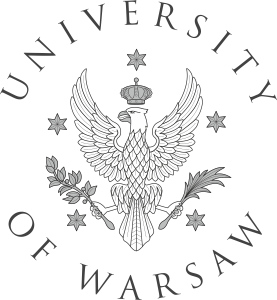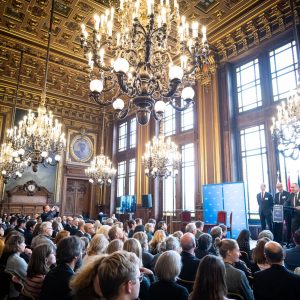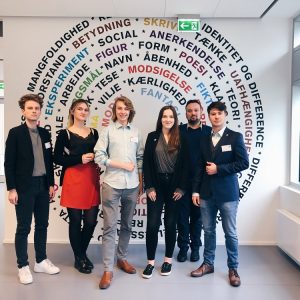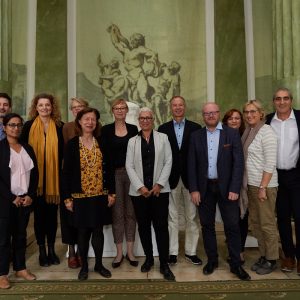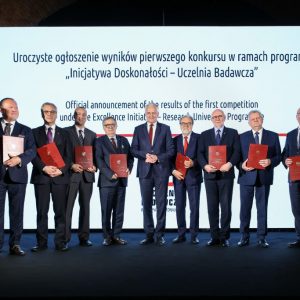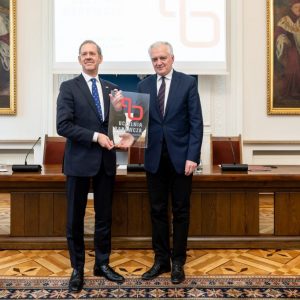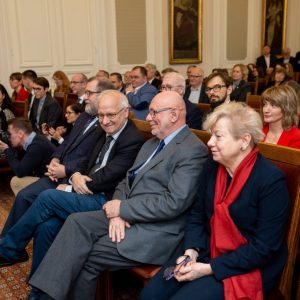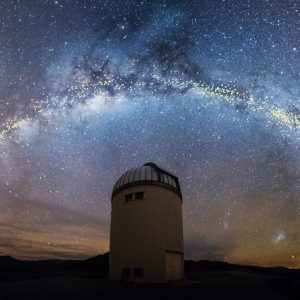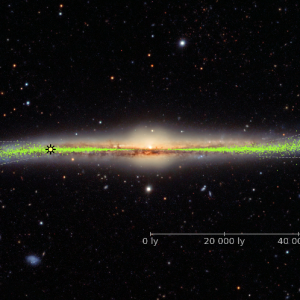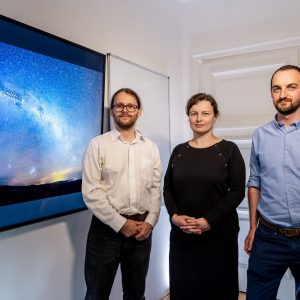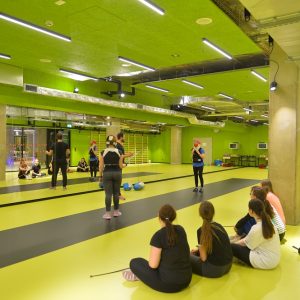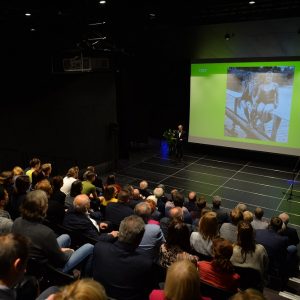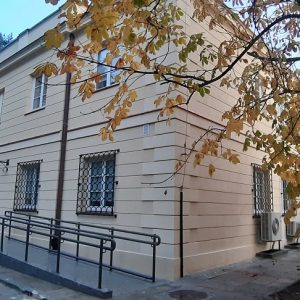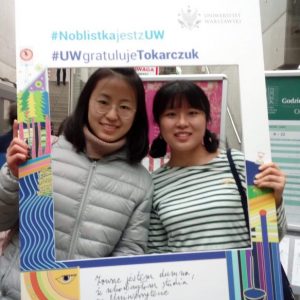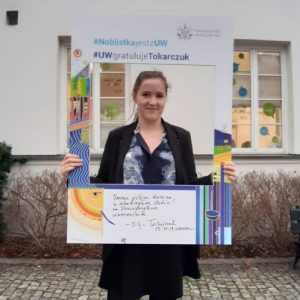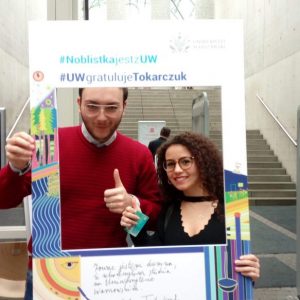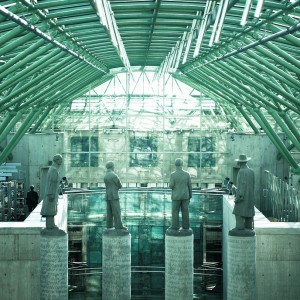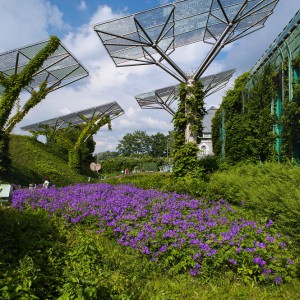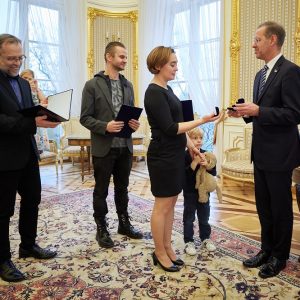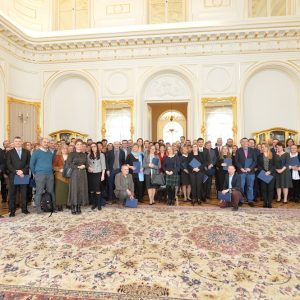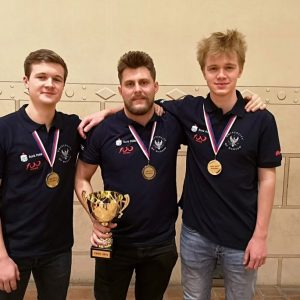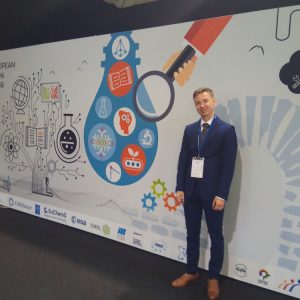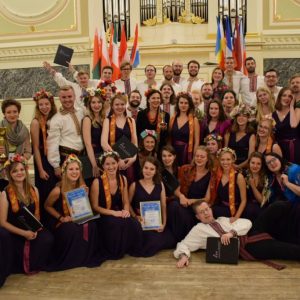20 stycznia 2020
The Centre of New Technologies invites to a seminar by
Łukasz Dziewit, Ph.D, D.Sc. and Łukasz Drewniak Ph.D, D.Sc.
Faculty of Biology, University of Warsaw
Title: Metal metabolism in bacteria – from biology to biotechnology
Date: January 24th, 2020 at 12 p.m.
Venue: Centre of New Technologies, Banacha 2C,
Lecture Hall 0142 (Ground floor)
Host: prof. Joanna Trylska
The treatment of metal-contaminated regions (especially those co-contaminated with other toxic substances) remains one of the most expensive environmental challenges currently faced by many countries. It appears that the employment of microorganisms in biotransformation of metals is a good solution to this problem. However, a key step in the waste management technologies is the understanding of the mechanism of various metals resistance, metabolism and transformation. During the seminar we will present the results of our analyses of metal metabolism in various bacteria (including extremophilic strains from Antarctic regions and ancient mines) and how we exploit this knowledge for development of novel environmental biotechnologies. We will show how we combine the classical environmental microbiology with recent advances in genomics and metagenomics for more successful identification of microbial traits that may maximize the benefits of metals bioremediation technologies. Finally, we will present examples of environmental technologies developed in our laboratory and successfully implemented in Poland and abroad.
16 stycznia 2020
The University of Warsaw Library prolongs its working hours. “BUW for owls” starts on 20th January. Students who will be preparing for exams now can use the library until 5 am.
Mid-year assessment period at the University of Warsaw begins on 28th January. The University of Warsaw Library meets expectations of students and prolongs its opening hours. Students who prefer burning the midnight oil can take part in “BUW for owls” action. From Monday 20th January to Saturday 1st February, the University of Warsaw Library will be open until the first-morning bus meaning until 5 am.
- On Saturday (January 25th and February 1st) the Library will be open from 9 am to 9 pm, on Sunday (January 26th and February 2nd) the Library will be open from 3 pm to 8 pm.
- After 10 pm Information Desk, Reading Room and open stacks on levels 1, 2 and 3 will be available;
- After 10 pm from Monday to Friday, and on Sunday, the Circulation Desk and the Closed Stacks will be closed.
- The Cloakroom next to Costa Coffee will be open until 5 am.
Only valid library cards holders can take part in “BUW for owls”.
We kindly remind you that during the nights no other drinks but bottled water and no food is allowed in the library.
More information >>
Source: www.en.uw.edu.pl
15 stycznia 2020
PhD position is available within OPUS 14 NCN grant „Mechanistic investigations for local thermal oxidation of thin MoS2”. Principal Investigator: dr hab. Robert Szoszkiewicz, prof. ucz. Deadline for applications: 16 February 2020. For more info see >> pdf
14 stycznia 2020
The Centre of New Technologies invites to a seminar by
Witold Konopka, PhD
Nencki Institute of Experimental Biology, Warsaw
Title: microRNA dependent regulation of neuronal plasticity in feeding behavior
Date: January 17th (Friday)
Time: at 12 p.m.
Venue: Centre of New Technologies, Banacha 2C,
Lecture Hall 0142 (Ground floor)
Host: prof. Marta B. Wiśniewska
Eating behavior of animals is controlled by neuronal circuits in the brain, mainly located within the hypothalamus. Hunger is induced by physiological signals e.g. leptin, informing the brain about energy storages in adipose tissue or glucose deficits during hypoglycemia. Additionally, other non-physiological factors may influence when and what do we eat. Those factors include sensory cues of especially palatable food or are entrained by circadian rhythm. Regulation of activity of neurons involved in the control of feeding and metabolism is achieved on many levels of gene expression. We are especially interested in post-transcriptional level of protein translation regulated by microRNAs. These short RNAs serve as a guides for the translation inhibiting complex RISC. We have generated transgenic mice with a mutation of the Dicer gene restricted to forebrain neurons of adult mice. The Dicer nuclease is an essential enzyme in the biogenesis of microRNAs. Mice lacking the Dicer gene in the arcuate nucleus of the hypothalamus developed an obesity phenotype due to increased feeding of regular chow diet. We have also examined how different diets: standard, high fat diet, Western diet and ketogenic diet influence microRNA levels in the blood and preference of mice towards consumed diet.
09 stycznia 2020

The 4EU+ Alliance appointed its Secretary General. This post has been taken by Volker Balli. The Secretary General will be heading the Alliance office in Paris and will be leading a cross-institutional team comprised of staff at all six 4EU+ member universities.
Volker Balli will drive and oversee the implementation of all activities of 4EU+, including the European University Initiative. He will also contribute to the overall development of the vision, mission and strategy of the Alliance and foster external contacts with 4EU+.
More about his career is available on the 4EU+ website.
4EU+ comprises six universities: Charles (Czech Republic), Heidelberg (Germany), Sorbonne (Paris), Warsaw (Poland), Milan (Italy) and Copenhagen (Denmark) which are public and research-intensive institutions. The Alliance has the ambition to create an integrated European university system, capable of empowering students, researchers and society as a whole to take on the challenges facing Europe. For more information, please visit www.4euplus.eu.
Source: www.en.uw.edu.pl
07 stycznia 2020

On 17th January, UW Welcome Point organises two information meetings for students who would like to get information on how to legalise their stay in Poland.
In the programme of the meetings:
- The legalisation of residence in Poland (visa, permanent residence permit)
- Differences between a student visa and a temporary residence permit
- The procedure of application for a residence permit
- Taking up a job during studies
- The legalisation of stay after obtaining a university diploma
- Polish descent and Card of the Pole holders’ rights
Both meetings will take place on 17th January in the Auditorium Maximum building (hall “A”) on the Main Campus.
Registration is available on the Welcome Point website.
Source: www.en.uw.edu.pl
03 stycznia 2020
The Centre of New Technologies invites to a seminar by
Joanna Rutkowska, PhD, DSc
Institute of Environmental Sciences, Jagiellonian University, Cracow
Title: „Family secrets revealed: meta-analytical insights into non-genetic maternal and paternal effects”
Date: 8th January 2020 (Wednesday)
Time: 1:00 pm
Venue: Centre of New Technologies, Banacha 2C,
Lecture Hall 0142 (Ground floor)
Host: Prof. Marta Szulkin
30 grudnia 2019
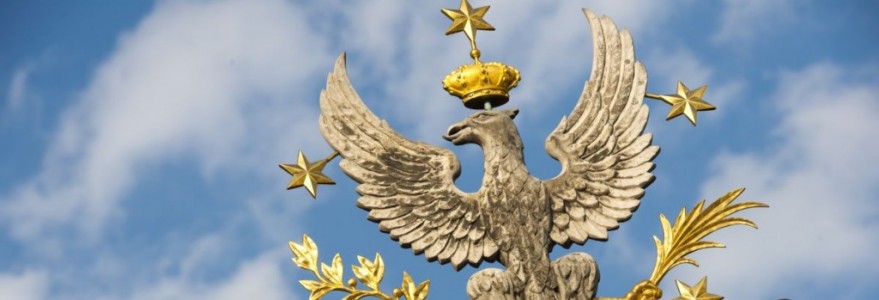
The University Council of the University of Warsaw advises the Rector and the Senate of the University of Warsaw and nominates candidates for the Rector position. To ensure transparency and good governance practices, the University Council announces an open call for candidates who are interested in the Rector position and meet the requirements. The deadline for sending applications: 31st January.
Open call for candidates for rector position at the University of Warsaw (pdf)
Applications should be submitted to the University Council by email (university.council@uw.edu.pl) and will be treated confidentially.
The deadline for applications is 31st January 2020.

More information on the University Council of the University of Warsaw
Source: www.en.uw.edu.pl
19 grudnia 2019
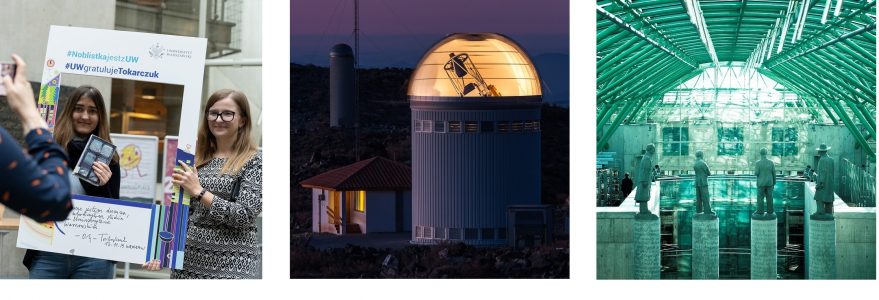
The passing year has been crucial for our university. UW kept developing its strategic initiatives, e.g. the 4EU+ Alliance, excellence initiative, and multiannual development plan. UW scientists contributed to breakthroughs, and the UW graduate won a Nobel Prize. What else happened at UW during the past year? We present 10 facts.
1. European University
The University of Warsaw is a member of 4EU+ that brings together six comprehensive, research-intensive, public universities from four regions of Europe. 4EU+ wants to strengthen the European vision of deepened cooperation and mutual enrichment by developing a new quality of cooperation in teaching, education, research and administration, leading to the creation of a truly integrated European University System.
In February 2019, the 4EU+ Alliance submitted an application in the Erasmus+ “European Universities” dedicated call. A few months later, in June, the European Commission selected 17 European University alliances, including 4EU+, which obtained funding for their projects to become the ‘European Universities’ of the future. November saw a kick-off event of the European Universities Initiative which took place in Brussels. In December, our university organised the first university-wide 4EU+ info meeting, which brought together nearly 300 participants. Many watched it online. More information >>
2. UW as a research university – an excellence initiative
The Ministry of Science and Higher Education awarded UW in the first competition in the framework of the “Excellence initiative – research university” programme. Out of 20 applications submitted in response to the call, the Ministry has selected 10 HEIs. The UW proposal was rated as the best and experts gave it the highest evaluation score. Obtaining the grant will enable our university to develop five priority research areas addressing main contemporary societal challenges. More information >>
The selected HEIs, including the University of Warsaw, will receive a state subsidy increased by 10% annually for 6 years (2020-2026).
3. A unique three-dimensional map of the Milky Way – an important discovery of UW astronomers
Astronomers from the Astronomical Observatory of the University of Warsaw constructed the most detailed 3-D map yet of the Milky Way. To create the map, they used a sample of over 2,400 Cepheids, young pulsating supergiants which brightness changes in a very regular pattern with a well-defined period ranging from hours to several dozen days. The majority of the stars have been newly identified in the photometric data collected by the Optical Gravitational Lensing Experiment (OGLE) survey. The map demonstrates that the Milky Way disk is not flat, it is warped at distances greater than 25,000 light years from the Galactic centre.
The study of UW astronomers was published in the journal Science. It was a breakthrough in astronomy which sparked off a tremendous amount of world media coverages. More information >>
4. Realised Investments of the multiannual development plan
In 2019, UW completed the realisation of its first investments funded by the multiannual development plan. Students and employees can use the sports halls situated in the University of Warsaw Library undergrounds. Also, thanks to the funding, the eastern part of the building at 4 Aleje Ujazdowskie Street was reconstructed. It will house offices of the Cooperation and Dialogue Centre, the UW new unit which aims to be a university cooperation and communication platform with the socio-economic environment.
5. Changes to the university organisation and structure
Following the new Law on Higher Education and Science, UW implemented new documents and established new organs. On 1st October 2019, the new Statute of the University of Warsaw (pdf) and Rules of Study at the University of Warsaw (pdf) entered into force. Also, the university set up four doctoral schools and appointed members to the new organ – the University Council of the University of Warsaw. What is more, UW established academic councils of the academic disciplines, the University Teaching and Learning Council. In the upcoming year, UW will announce members of the teaching and learning councils.
6. Nobel Prize for Olga Tokarczuk
Olga Tokarczuk, who graduated from the UW Faculty of Psychology, was awarded the 2018 Nobel Prize in Literature “for a narrative imagination that with encyclopedic passion represents the crossing of boundaries as a form of life.” On the occasion of Nobel prize-giving to Olga Tokarczuk, UW encouraged its students and employees to take part in an action “UW congratulates Tokarczuk” and express their congratulations to the outstanding writer. The UW community members could take photos using a specially prepared photo frame which referred to Tokarczuk’s works and included a quotation of the writer’s letter to Prof. Marcin Pałys, UW rector. More information >>
7. UW for the climate
On 1st October, UW rector set up an advisory board “UW for the climate”. It comprises UW researchers, employees and representatives of students and doctoral candidates. The main aim of the group is to conduct and coordinate various UW activities preventing from the climate crisis. In November, the Senate of the University of Warsaw formulated an official position of the university on the crisis. Previously, the faculties of Psychology, Political Sciences and International Studies, Economics and Biology have adopted declarations on climate change.
8. 20 years of the University of Warsaw Library
December saw the 20th anniversary of the University of Warsaw Library (BUW) in Powiśle district. The building is known for its unique architecture and roof gardens. On the occasion of 20 years of BUW in Powile, the library prepared a series of events, e.g. dictation, presentation of the first edition of the “Polish Language Dictionary” by S.B. Linde, a meeting of employees, readers and friends of the University of Warsaw Library, and the opening of the exhibition “Reminiscences II” which commemorates important events and visits of famous people to the Library.
9. Awards for employees
In November, Prof. Paweł Stępień, Prof. Agata Dziewulska and Prof. Andrzej Dragan, representatives of humanities, social sciences, as well as exact and natural sciences, received didactic awards given by the UW rector. The selected employees have great achievements in teaching and introducing innovative education methods. In March, 134 employees, who have achieved outstanding results in research or teaching, were awarded. These employees will be receiving an increased salary. In 2015, rector of the University of Warsaw established a special fund supporting those scholars who contribute to the development of the university.
10. Students’ success
Not only UW scientists but also UW students have significant achievements. Many of them have won awards and distinctions in programming contests, scientific, cultural and sports competitions. UW can be proud of having winners of the ACM International Collegiate Programming Contest (Central Europe Regional Contest), a laureate of the EU Contest for Young Scientists, students singing in the UW choir which won many awards, and winners of the general classification of the Polish Academic Championships.
17 grudnia 2019
The Centre of New Technologies invites to a seminar by
Prof. Michael Feig
Michigan State University, USA
Title: Cellular crowding near membranes: Implications for biomolecular diffusion and clustering
Date: 20 December (Friday) 2019 at 12 p.m.
Venue: Centre of New Technologies, Banacha 2C,
Lecture Hall 0142 (ground floor)
Host: Prof. Joanna Trylska
Abstract
The interior of biological cells is highly crowded with very high macromolecular concentrations that impact biomolecular stability, diffusion, and solubility. While there is some understanding of these effects inside the cytoplasm, very little is known how the presence of membrane surfaces modulates crowding effects. Biological membranes represent the outer boundary of cells, but they are also present inside cells to contain organelles and in the endoplasmic reticulum or Golgi apparatus. To gain insights into how a crowded environment may interact with membrane surfaces, results from computer simulations of concentrated protein solutions near phospholipid bilayers over microsecond time scales are presented1. The main insight is that the presence of the membrane appears to create a protein depletion zone at the membrane surface that leads to increased clustering and slower diffusion away from the membrane but allows proteins that enter this zone to overcome the slow diffusion that is otherwise encountered in the crowded bulk environment. In addition, proteins that do interact with the membrane surface appear to induce curvature. The finding is similar to crowding-induced membrane bending reported previously but without requiring specific membrane-interacting protein domains. The results are further interpreted via coarse-grained models to access larger spatial and temporal scales and results with pure lipid bilayers are compared with simulations where an integral membrane protein was embedded into the bilayer.
1G. Nawrocki, W. Im, Y. Sugita, M. Feig: Clustering and Dynamics of Crowded Proteins near Membranes and Their Influence on Membrane Bending. PNAS (2019), 116, 24562-24567

